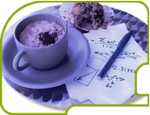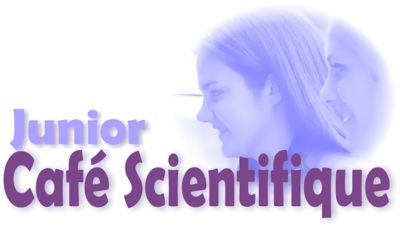| |
In the press ...
 30th March 2007
30th March 2007 |
|
An experiment in bringing science to life
By Sheena
Hasting
|
|
 3rd January 2006
3rd January 2006
|
In December 05, the second American junior cafe launched in
Syracuse, NY.
Go Ask the Experts
By Maureen
Nolan
There's a new
cafe scene in Armory Square for patrons in search of meaningful
conversation if they can catch a ride downtown. Junior Cafe
Scientifique's target audience is students in grades six and up
who want to ponder cool concepts with a science professional who
speaks their language.
Each cafe is
scheduled for 9:30 to 11 a.m. on the third Saturday of each
month at the Milton J. Rubenstein Museum of Science &
Technology. When it debuted Dec. 17, about 30 students from the
Syracuse area showed up despite the early hour and snowy
weather. Pretty much the entire Elmwood Elementary School
science club was there.
The inaugural speaker had the audience from the word
"cosmology." "I study cosmology," Mark Trodden told the crowd.
"I study everything in the universe, which is a great job."
Trodden is alumni associate professor of physics at Syracuse
University, and he contends that if you talk about cosmology the
right way, anyone would find it interesting.
He seemed to prove his point at the cafe. He began by talking
about the change in sound as a car zooms by to introduce the
Doppler effect. He worked his way into the expansion of the
universe and its beginnings, too.
Trodden asked students to consider that 13.7 billion years
ago, all matter was basically on top of everything else. Picture
a mass as small as a baseball. "But wait," said a voice from the
audience. "If it was all the size of a baseball, what would be
outside it?"
Big ideas,big questions and a snack.
"It's cool,"
said Tyhana Darby, 9, a member of the Webster Elementary School
science club. She was especially struck by the thought of all
the galaxies moving farther and farther away from each other.
Lincoln Middle
School teacher Gwen Maturo hatched the idea for the junior cafe.
Maturo runs SECME, a science, technology, engineering and math
club at Lincoln. She's a national SECME master teacher and is
active in the Technology Alliance of Central New York, among
other science-boosting efforts. She's scouting for new ways to
turn students on to science, technology, engineering and math.
The United States is facing shortages in those fields, she said.
 Maturo
was inspired when she went to Syracuse's new Cafe Scientifique
for adults. It's an idea from abroad that recently took root in
Syracuse, organized by Trodden and several others. Here's the
description of the grown-up cafe from its Syracuse Web site:
"Cafe Scientifique is a place where scientists and
scientifically interested nonscientists can come together
informally to hear about interesting science, old and new, and
discuss its implications in a friendly, cordial way, over drinks
and snacks." It's a chance for regular people to get questions
answered by experts, Maturo said. She loves it. Maturo
was inspired when she went to Syracuse's new Cafe Scientifique
for adults. It's an idea from abroad that recently took root in
Syracuse, organized by Trodden and several others. Here's the
description of the grown-up cafe from its Syracuse Web site:
"Cafe Scientifique is a place where scientists and
scientifically interested nonscientists can come together
informally to hear about interesting science, old and new, and
discuss its implications in a friendly, cordial way, over drinks
and snacks." It's a chance for regular people to get questions
answered by experts, Maturo said. She loves it.
The juniorcafe
operates in the same vein. Maturo found a junior cafe in San
Diego, but she knows of none other in the U.S. To get the
Syracuse junior cafe going, Maturo secured the help of the
Technology Alliance as a sponsor. Peter Plumley, exhibits
program manager at the MOST and an associate research professor
of civil engineering at SU, said the cafe should focus on grades
six through nine because students are still open-minded at that
point. "They are still very excitable, so we can trigger
curiosity," he said.
Marie Choi, of
Westvale, was there with her son, Holden, a sixth-grader.
Hearing about science from professionals who do science every
day makes it meaningful to children, Choi said. "It's kind of
like a little 'Nova' special right here," she said.
|
 |
|
I, Robot: could it happen?
Mars probe: what can it really tell us?
Unravelling the rice genome: GM disaster or end
to hunger?
Dramatic headlines that concern us all!
Junior
Café Scientifique gives pupils the chance to talk about these
concerns with working scientists. In an informal ‘café’
atmosphere, they can discuss these issues and many more in
contemporary science and technology.
Anyone
can come to a Café Scientifique – teachers and pupils, any age,
any status, any interest. Cafés happen out of lesson time, in
cafeterias, common rooms or libraries – any place where audience
and speaker can meet face to face.
The
speakers are volunteers from local universities and industry,
ranging from professors to young PhD students and the cafés are
organised and run by the pupils themselves.
This project is starting in schools across the
north of England. If you are a parent, teacher, governor or
pupil and you’d like to find out more, please visit their
website
http://www.juniorcafesci.org.uk/ or email
[email protected] |
 |
|
|

